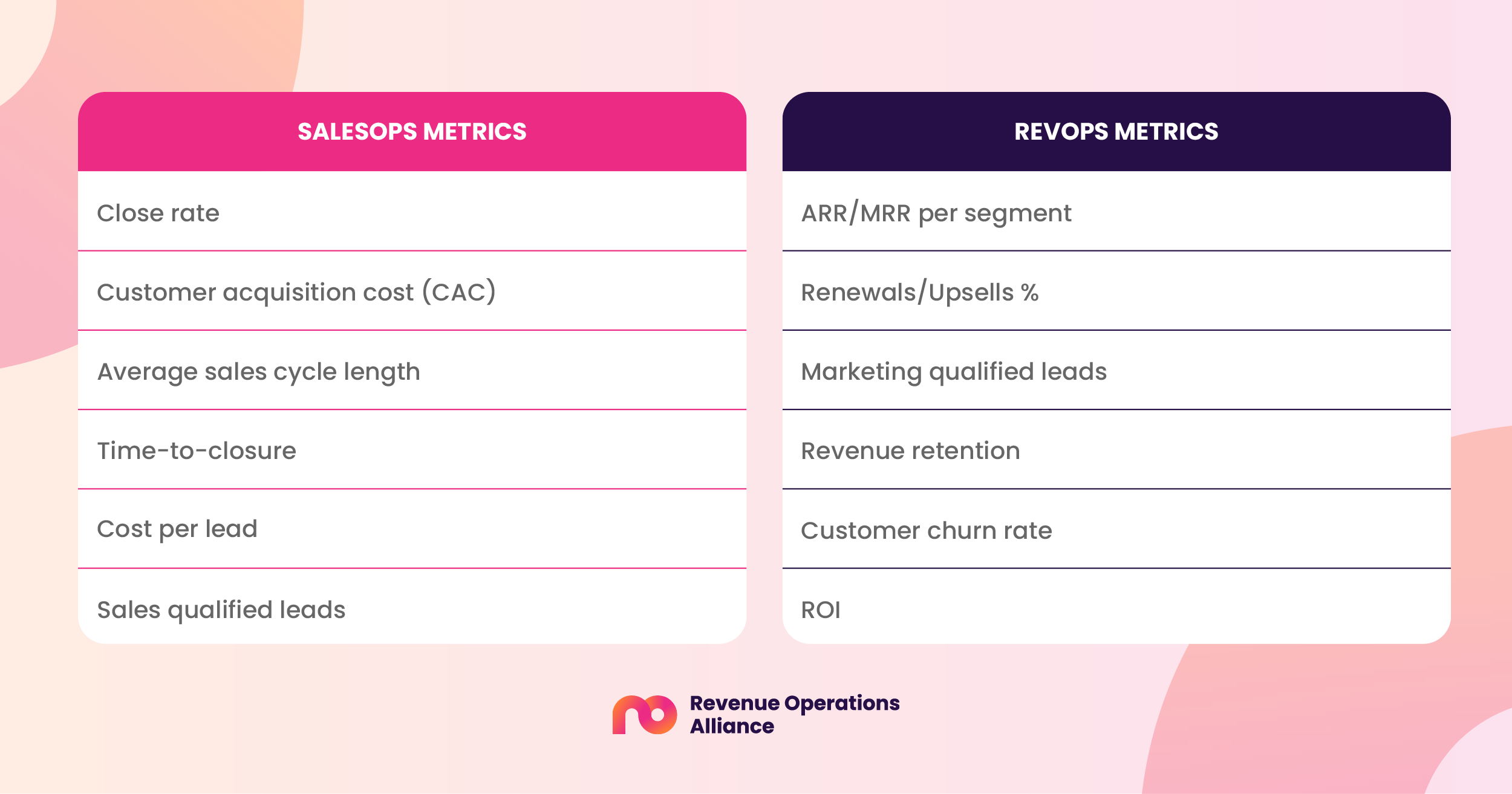Operations management involves optimizing processes within an organization - but what’s the difference between revenue operations and sales operations?
The sales team is all about generating revenue, so aren’t they just the same thing?🤔
While there are some similarities between the functions, there are also a lot of key differences between RevOps and sales ops. Let’s dive into the underlying functions and goals of revenue operations vs sales operations.
In this article we’ll cover:
- What is revenue operations?
- What is sales operations?
- What are the key differences between RevOps and sales ops?
- Which function is best for your business?
- Can a sales ops professional transition to RevOps?
What is revenue operations?
Revenue operations (RevOps) focuses on driving revenue growth across departments such as sales, marketing, and customer success, by reducing blockers caused by silos.
RevOps aims to increase efficiency across departments by unifying goals, data, and tech stacks. This sharing of data across departments allows for more streamlined handoffs between marketing, sales, and customer success teams.
In turn, this creates a better customer experience across the customer journey.
Overall, the revenue operations function looks at the big picture to align teams, improve customer experience, and optimize processes by removing blockers.
Want to learn more? Check out this blog… 👇

What are the benefits of revenue operations?
Some of the key benefits of revenue operations include:
- Aligned teams
- Shared data
- Optimized processes
- A more refined tech stack
- Improved customer experience (CX)
What is sales operations?
Sales operations or sales ops focuses on providing high-level support to your sales team. This involves equipping sales teams with the resources they need to succeed and reporting on the key sales data.
The function aims to enhance sales practices by optimizing processes, setting goals, and creating the perfect tech stack. Sales ops can also own territory mapping, sales forecasting, onboarding, and recruitment.
Your sales ops team may even help your sales enablement team with onboarding and training!
This can help save your sales department time by streamlining the sales process and removing unnecessary admin tasks from their workload. All while producing the perfect sales strategy to close deals and ensure sellers understand their KPIs.
Overall, the sales operations function aims to help the sales team spend more time doing what they’re best at - closing deals!
What are the benefits of sales operations?
Some of the key benefits of sales ops are:
- Sellers spend more time selling
- Sales forecasting
- Optimized sales strategy
- Refined sales tech stack
- Clear KPIs

What are the key differences between RevOps and sales ops?
While there are a lot of similarities between RevOps and sales ops such as: streamlining processes and optimizing your tech stack, there are also a few key differences.
Department served
The most obvious difference between RevOps and sales ops is the departments these functions work with. Sales operations tends to only work with the sales team, while RevOps works with sales, marketing, and customer success, as all three of these revenue-generating functions need support.
This means that the goals and priorities might differ amongst sales ops and RevOps teams, as they have different stakeholders!
Impact on customers
By extension, these functions have different impacts on your customers. Sales ops mainly focus on sales, so can drastically increase the relationship between your sales reps and your customers up to the point a deal is closed.
However, revenue operations takes a broader approach and focuses on improving CX over the entire customer journey, from marketing and sales to customer success. This allows a seamless experience for your customers, making purchasing easier!
Your customer doesn’t just disappear once a sale is completed and the prospect becomes a customer. That means your customer success team needs operations support too.

Approach to revenue streams
Similarly, sales operations and revenue operations take different approaches to revenue streams.
Sales ops tend to focus on helping their sellers sell, which leads to more deals closed but doesn’t help to find new leads.
RevOps on the other hand, works with existing revenue streams while also helping teams to find new ones. Their work with the marketing function helps to bring in new audiences and pass them over to sales.
Plus, RevOps can also work with customer success to retain, and upsell to existing customers - improving CX across the customer's lifetime!
Metrics
While some metrics may overlap between these functions, they mostly measure different KPIs. Sales ops tends to focus on, you guessed it, more sales-oriented metrics such as close rate.
While RevOps tends to focus more on revenue growth, tracking metrics like ROI and revenue retention.
Here are a few metrics that might be tracked by each function:

RevOps vs sales ops: Which function is best for your business?
Both of these functions can drastically improve your business’s efficiency and increase your revenue - but which one is right for your business?
Typically sales ops comes first in an organization, so if you don’t yet have a sales operations team that might be the best place to start. This is because sales ops can help you to take the first steps in optimizing your sales processes.
This advice is especially true if your business is still in its early stages, as you might not even have a marketing or customer success team yet!
But if you:
- have a larger organization with silo problems,
- want to keep better track of your ROI,
- or aren’t making use of your tech stack.
Then a RevOps team might be a better option for your business.
The introduction of a revenue operations team can help you to reduce friction across departments, keep track of your revenue KPIs and refine your tech stack. In turn, boosting your productivity and revenue, while improving your CX.

Fancy the best of both worlds?
Thinking about incorporating both functions into your business? Go for it!
If you meet the criteria above and have the budget for both teams, then adding both functions into your organization can be helpful.
Sales operations can focus on supporting sellers with SQLs, while RevOps can focus on big-picture strategy. RevOps can also support marketing to drive MQLs and reduce friction when handing over to sales.
Can a sales ops professional transition to RevOps?
Yes, it’s extremely common for sales ops professionals to transition to RevOps. Revenue operations is still fairly new, and most applicants won’t have direct RevOps experience. The next best thing is often sales operations experience.
These roles have similar skills and knowledge of sales processes and operations, so with the drive to learn about marketing and customer success processes, a sales operations professional can easily transition to RevOps.
Skills these professionals have in common include:
- Selling & sales strategy
- Problem-solving
- Communication
- Technical proficiency
- Prioritization
In our State of Revenue Operations report, we discovered almost almost one in five (19.5%) revenue operations professionals previously worked in sales operations. This means moving from sales ops to RevOps is actually the most common career progression into revenue operations.
Final thoughts
Sales operations tends to focus on optimizing processes and strategy for your sales team. While RevOps focuses on reducing silos and improving processes across revenue streams.
These are both useful functions to have in your organization and can drastically increase your productivity and revenue streams.
Fancy chatting with some RevOps pros? Join us on Slack! 👇





